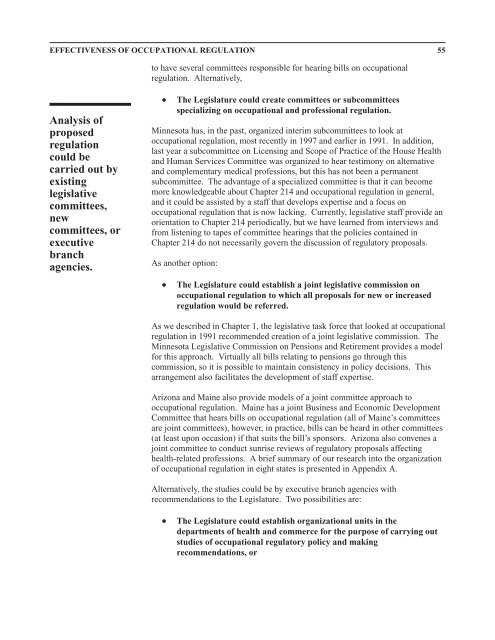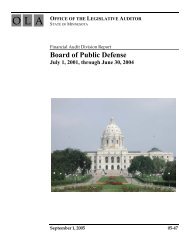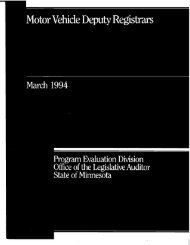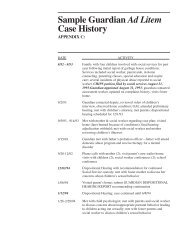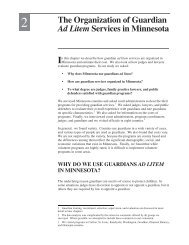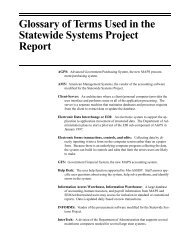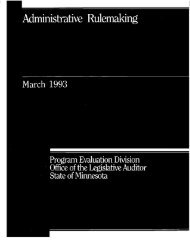Occupational Regulation - Office of the Legislative Auditor
Occupational Regulation - Office of the Legislative Auditor
Occupational Regulation - Office of the Legislative Auditor
Create successful ePaper yourself
Turn your PDF publications into a flip-book with our unique Google optimized e-Paper software.
EFFECTIVENESS OF OCCUPATIONAL REGULATION 55<br />
to have several committees responsible for hearing bills on occupational<br />
regulation. Alternatively,<br />
Analysis <strong>of</strong><br />
proposed<br />
regulation<br />
could be<br />
carried out by<br />
existing<br />
legislative<br />
committees,<br />
new<br />
committees, or<br />
executive<br />
branch<br />
agencies.<br />
· The Legislature could create committees or subcommittees<br />
specializing on occupational and pr<strong>of</strong>essional regulation.<br />
Minnesota has, in <strong>the</strong> past, organized interim subcommittees to look at<br />
occupational regulation, most recently in 1997 and earlier in 1991. In addition,<br />
last year a subcommittee on Licensing and Scope <strong>of</strong> Practice <strong>of</strong> <strong>the</strong> House Health<br />
and Human Services Committee was organized to hear testimony on alternative<br />
and complementary medical pr<strong>of</strong>essions, but this has not been a permanent<br />
subcommittee. The advantage <strong>of</strong> a specialized committee is that it can become<br />
more knowledgeable about Chapter 214 and occupational regulation in general,<br />
and it could be assisted by a staff that develops expertise and a focus on<br />
occupational regulation that is now lacking. Currently, legislative staff provide an<br />
orientation to Chapter 214 periodically, but we have learned from interviews and<br />
from listening to tapes <strong>of</strong> committee hearings that <strong>the</strong> policies contained in<br />
Chapter 214 do not necessarily govern <strong>the</strong> discussion <strong>of</strong> regulatory proposals.<br />
As ano<strong>the</strong>r option:<br />
· The Legislature could establish a joint legislative commission on<br />
occupational regulation to which all proposals for new or increased<br />
regulation would be referred.<br />
As we described in Chapter 1, <strong>the</strong> legislative task force that looked at occupational<br />
regulation in 1991 recommended creation <strong>of</strong> a joint legislative commission. The<br />
Minnesota <strong>Legislative</strong> Commission on Pensions and Retirement provides a model<br />
for this approach. Virtually all bills relating to pensions go through this<br />
commission, so it is possible to maintain consistency in policy decisions. This<br />
arrangement also facilitates <strong>the</strong> development <strong>of</strong> staff expertise.<br />
Arizona and Maine also provide models <strong>of</strong> a joint committee approach to<br />
occupational regulation. Maine has a joint Business and Economic Development<br />
Committee that hears bills on occupational regulation (all <strong>of</strong> Maine’s committees<br />
are joint committees), however, in practice, bills can be heard in o<strong>the</strong>r committees<br />
(at least upon occasion) if that suits <strong>the</strong> bill’s sponsors. Arizona also convenes a<br />
joint committee to conduct sunrise reviews <strong>of</strong> regulatory proposals affecting<br />
health-related pr<strong>of</strong>essions. A brief summary <strong>of</strong> our research into <strong>the</strong> organization<br />
<strong>of</strong> occupational regulation in eight states is presented in Appendix A.<br />
Alternatively, <strong>the</strong> studies could be by executive branch agencies with<br />
recommendations to <strong>the</strong> Legislature. Two possibilities are:<br />
· The Legislature could establish organizational units in <strong>the</strong><br />
departments <strong>of</strong> health and commerce for <strong>the</strong> purpose <strong>of</strong> carrying out<br />
studies <strong>of</strong> occupational regulatory policy and making<br />
recommendations, or


